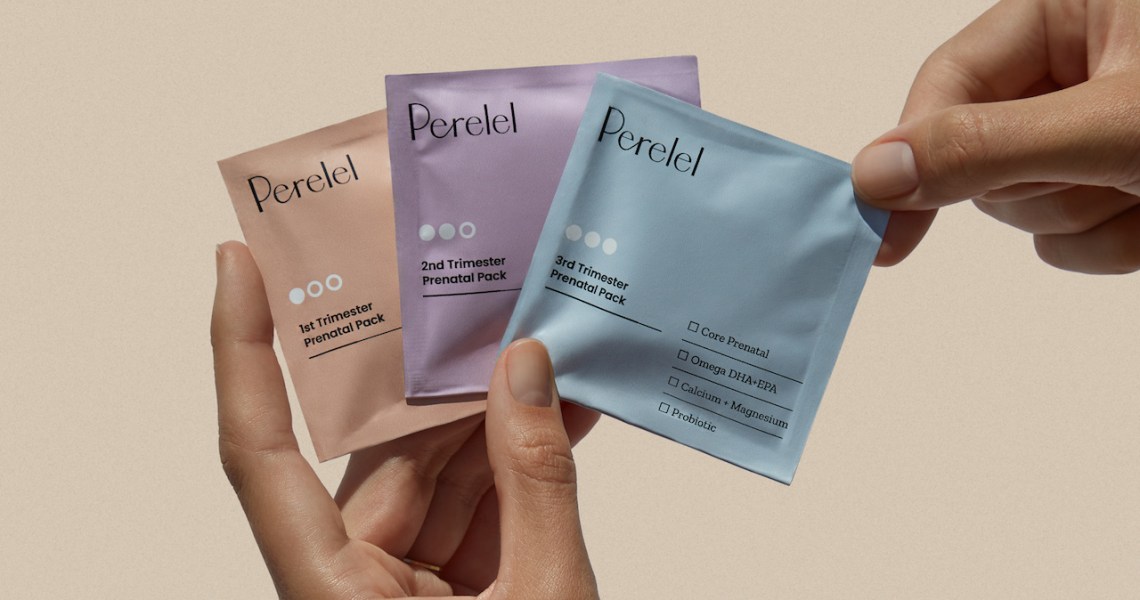When Tori Thain Gioia was pregnant with her daughter in 2019, she received news that came as a shock: Her baby would be born with a cleft lip.
“It really knocked me off my feet, trying to understand why,” said Gioia, a Harvard Business School and beauty industry alum. She had taken a prenatal vitamin as recommended by her doctor to get the folic acid that is supposed to prevent the birth defect. But when she talked to her doctor, she was told that “folic acid” as an ingredient in supplements is not as bioavailable as folate, and that higher amounts are recommended in the earliest stage of pregnancy. Unsatisfied with the prenatal vitamin brands being offered, she decided to start her own.
Founded by Gioia and fellow millennial mom and Vogue alum Alex Taylor, as well as obstetrician-gynecologist Dr. Banafsheh Bayati, maternal supplement brand Perelel launches through DTC on Wednesday. The subscription-based brand’s points of differentiation include the use of folate, a focus on bioavailable ingredients and different dosing for each phase of pregnancy. The brand also offers a range of products to maintain customers for longer than just the nine months of pregnancy, including supplements for fertility as well as post-partum supplements intended for use for five years after giving birth. The launch comes at a time when wellness and beauty startups are launching even more products for millennial moms as concerns grow about product efficacy and safety.

Doctors routinely recommend that all pregnant women take a prenatal vitamin, but often provide no guidance on specific brands. This is despite the fact that prenatal vitamins are not regulated as drugs by the FDA. Concerns about the safety of prenatal vitamins has been on the rise as reports of dangerous ingredients like lead have surfaced. In 2013, the FDA rejected a citizens’ petition calling for stronger regulation of these supplements.
“What led us into this space was learning how little regulation there is from the FDA,” said Gioia. “There are no rules or regulation on what can be called a prenatal [vitamin].”
“I don’t think we can overstate how much the lack of regulation impacts trust,” said Chelsea Allison, the founder of maternal wellness platform Motherfigure. “Not only is there no governing organization overseeing the safety, purity and content of prenatal vitamins, but there are also massive gaps when it comes to standards around dosage and effectiveness.” She noted that this puts the burden of research on the mother. But credible information is hard to come by.
According to Gioia, Google search results for pregnancy-related information often bring up results from a “blog or a user-generated forum.”
“There’s no way to really understand how you could trust what was being said.” said Taylor. “There’s a lot of conflicting information.”
Expecting mothers are also frustrated that they aren’t getting this information from their doctors, either.
“I marched into my OB-GYN’s office with my bottle of prenatal vitamins, and I said, ‘Is this is a good prenatal?’ And she said, ‘You know, they’re all the same,’ which really shocked me,” said Taylor of her experience.
Doctors “lack the time in their appointments; their schedules are so packed the way they have to see patients today,” said Gioia. “They don’t have time to dive in and focus on this side of treating a patient and [evaluating] the nutrients,” she said, referring to details on prenatal vitamins.

With millennials wary of drugstore supplements, DTC supplement brands have provided a growing range of prenatal options in recent years, including Ritual, Persona, Olly, Thorne, Best Nest, Premama, Natalist and Eu Natural; beauty brand Honest Company also offers a prenatal. This is part of a broader push among wellness and beauty companies to market products in all categories as safe for pregnancy, including clean beauty. Mom-focused skin care has also boomed as a category with brands like Mutha, Pipette, Matrescence, Evereden, Hatch, The Honest Company, London Grant and Esker offering products specifically for mothers. Maternity-related menu categories are featured on the sites of many beauty retailers including Credo Beauty, Ulta, Violet Grey and Blk + Grn.
“We’re at an interesting inflection point where we know more than ever about the harms that everyday products and chemicals do, which contributes to this mood of wariness or skepticism,” said Allison, who recently launched a pregnancy skin-care safety guide on Motherfigure. “We also have a natural movement that has taken root over many years. The backlash to that movement recognizes that natural and organic are not necessarily synonymous with safe — or necessary.”
Perelel is offering community support through a private Facebook group, as well as a panel of doctors to provide information around pregnancy concerns, including prenatal nutrition, pelvic floor health and psychiatry on its site.
According to Taylor, pregnancy is a “pivotal time” for changing brand preferences. “It’s when she starts buying a totally different detergent and maybe buying a different brand of milk, and now she’s buying a new brand of vitamins.”




